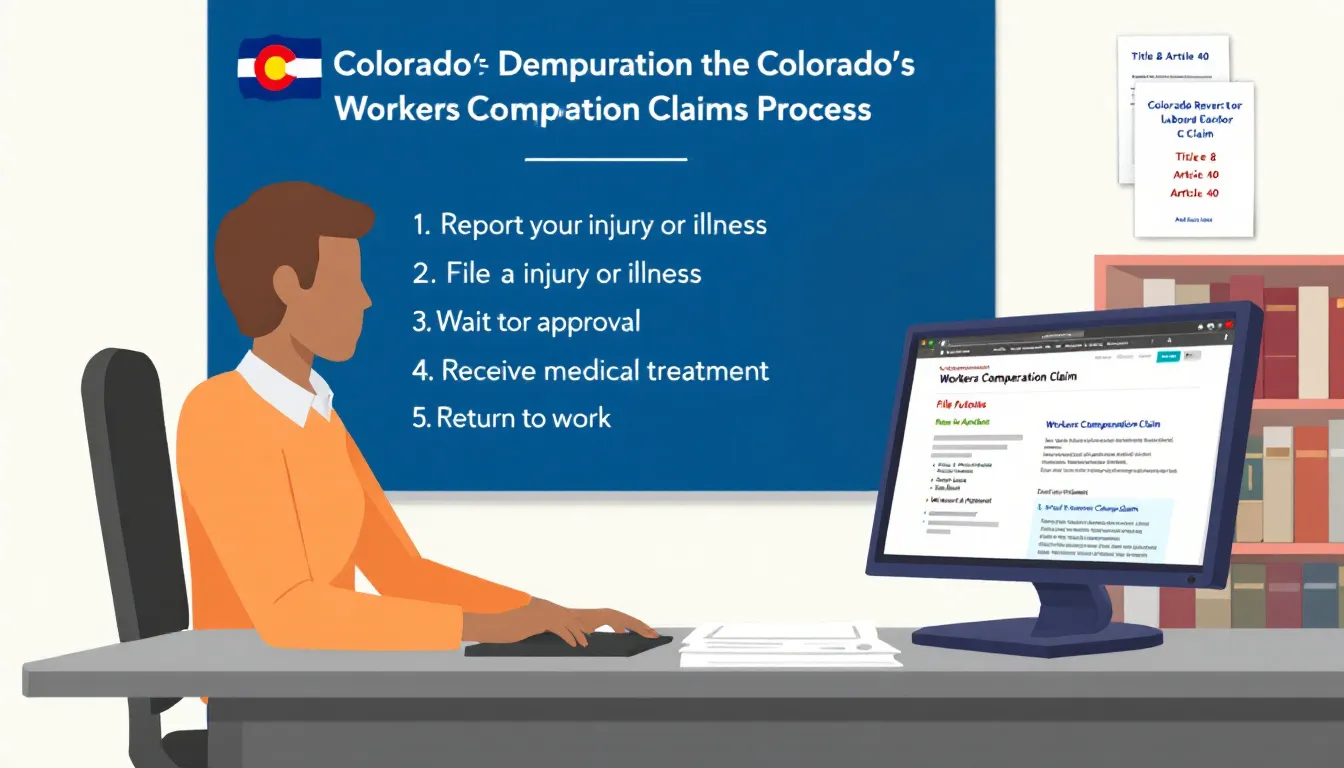Top Colorado Workers Compensation Attorney: Your Trusted Legal Partner
Injured at work in Colorado? You might be wondering why hiring a Colorado workers compensation attorney is necessary. A skilled attorney can help you navigate the complicated claims process and ensure you get the benefits you deserve. Understanding Colorado workers compensation law is crucial for navigating the claims process and securing benefits. This article will explain the importance of legal representation, steps to take after an injury, and tips for choosing the right attorney.
Are you ready to begin your workers’ compensation claim? 📞 Contact our Pueblo, Colorado office at (719) 309-9484 or fill out our secure contact form to arrange a free evaluation today.
Key Takeaways
-
Hiring a Colorado workers’ compensation attorney significantly improves the likelihood of securing fair compensation, with represented employees obtaining settlements up to four times higher than those without legal assistance.
-
Understanding the types of workers’ compensation benefits, including medical care, lost wages, and disability benefits, is essential for making informed decisions regarding claims and navigating the complexities of the system.
-
Promptly reporting workplace injuries and following procedural steps are crucial in strengthening workers’ compensation claims and avoiding denial, with legal guidance helping to address common challenges faced during the claims process.
Introduction to Workers Compensation
Workers’ compensation is a system designed to provide financial support and medical care to employees who suffer work-related injuries or illnesses. In Colorado, employers with one or more employees are required to carry workers’ compensation insurance, which covers medical expenses, lost wages, and other benefits for injured workers. This system operates on a no-fault basis, meaning that injured workers can receive benefits regardless of who was at fault for the injury. This ensures that employees can focus on recovery without the added stress of proving fault.
Navigating the workers’ compensation system can be complex, and this is where Colorado workers compensation attorneys come into play. These legal professionals specialize in helping injured workers file their workers compensation claims, ensuring that all necessary documentation is submitted correctly and on time. They also advocate for the injured worker’s rights, helping to secure the maximum benefits available under the law. Whether dealing with medical expenses, lost wages, or other related costs, having a knowledgeable attorney can make a significant difference in the outcome of a claim.
Why You Need a Colorado Workers Compensation Attorney

Hiring a Colorado workers’ compensation attorney can dramatically increase your chances of securing fair compensation for your injuries. Statistics show that injured employees represented by attorneys typically secure settlements that are four times greater than those who handle claims independently. The primary role of a workers’ compensation lawyer is to serve as your advocate, ensuring that you receive the maximum benefits owed to you. Without expert guidance, you risk missing opportunities and receiving reduced compensation in the complex workers’ compensation system. A Colorado workers compensation lawyer can help navigate these complexities.
For those injured on the job in Denver, hiring a Denver workers compensation attorney is crucial to navigate local legal complexities and secure fair compensation.
Employers and insurance companies often prioritize minimizing costs over supporting injured workers, which can hinder fair claim settlements. They may use various tactics to undermine your claim, making legal representation crucial. A knowledgeable attorney can help you avoid common pitfalls and errors that could jeopardize your insurance carrier claim.
Their expertise helps you navigate the intricacies of workers’ compensation laws and secure a successful settlement.
Understanding Workers Compensation Benefits
Workers’ compensation benefits, also known as workers comp benefits, are designed to support injured workers by covering:
-
Medical care, including hospital bills and rehabilitation costs
-
Lost wages, providing lost wage benefits and wage replacement benefits during the recovery period
-
Disability benefits, assisting employees in managing their financial compensation burdens and ensuring access to worker’s compensation.
These medical benefits are crucial in helping injured employees recover without the added stress of financial burdens.
In Colorado, disability benefits include both temporary and permanent disability payments, depending on the severity and recovery time of the injury. These benefits are generally exempt from taxation, providing an added financial relief to recipients.
However, rising medical bills, especially for severe injuries, present ongoing challenges for the workers’ compensation system. Knowing these benefits and their application to your situation helps in making informed decisions about your claim.
Steps to Take After a Workplace Injury
The first step after being injured on the job is to notify your employer immediately. Reporting the injury in writing within 10 days is crucial to avoid reducing your compensation. Your employer has a responsibility to document the injury properly, but if they fail to do so, you should create a detailed statement about what happened. Promptly informing your employer and documenting the incident can significantly strengthen your workers’ compensation claim and help prevent on the job injury and workplace injuries.
Seeking immediate medical attention is equally important. This not only ensures your health and safety but also establishes the seriousness of your injury or illness for the claim. In Colorado, you can choose from a list of doctors provided by your employer for your medical treatment. If your condition worsens, it is crucial to seek emergency medical treatment.
Diligently following these steps can greatly impact the outcome of your workers’ compensation claim, leading to more favorable results.
Filing a Workers Compensation Claim in Colorado

Filing a workers’ compensation claim in Colorado involves several critical steps. First, you must file the Workers’ Claim for Compensation form within two years of the injury or the discovery of an occupational disease. Delaying the injury report beyond 10 days can lead to claim denial. Employers are required to report the injury to their insurance within 10 days after it has been reported by the employee.
The insurance company then has 20 days to approve or deny the workers’ compensation claim. During this period, a knowledgeable workers’ compensation attorney can provide valuable guidance and support, ensuring all necessary documents are correctly submitted. If a claim is denied, workers have the option to apply for an expedited hearing to challenge the decision and potentially receive timely benefits.
Once the claim is accepted, benefits start either immediately or soon after. Prompt and accurate filing of the claim is crucial to securing your benefits.
Common Challenges in Workers Compensation Claims
Navigating workers’ compensation claims can be fraught with challenges. One of the most common issues is claim denial. If your claim is denied, you must appeal the decision with the help of an attorney. Insurance companies often look for inconsistencies in the worker’s story or situation to justify denying the claim. Workers compensation insurance companies often seek to minimize payouts, making legal representation crucial to ensure fair compensation. You must pursue the claim within six months after denial. Otherwise, the insurance can file a motion to close the claim for lack of prosecution.
Strict timelines also pose a challenge. For example, the time limit to request a hearing if a work injury claim is denied is 45 days. Moreover, not following prescribed medical advice can weaken your claim. Compensation can be reduced if the worker’s injury resulted from willful safety violations or substance influence, complicating settlement negotiations.
Employers and insurance companies often use tactics to undermine claims and minimize costs. An attorney can navigate these complexities, address medical disputes, and negotiate fair settlements. Recognizing these potential hurdles helps you better prepare and advocate for your rights.
How to Choose the Right Colorado Workers Compensation Attorney

Choosing the right attorney is vital for a successful workers’ compensation claim. Selecting an attorney specializing in workers’ compensation is crucial because they understand the complexities and nuances of this area of law. It is important to consult Denver workers compensation attorneys who understand the local legal landscape and can provide specialized assistance. When consulting potential attorneys, ask about their experience with cases similar to yours and their overall success rates. For instance, Brianne Falgien has been recognized multiple times for her outstanding performance and leadership in personal injury and workers’ compensation law.
FWI Legal is known for its client-centric approach, providing personalized attention to each case. Clients often report feeling supported and valued, with quick responses and genuine care from their attorneys.
Consulting multiple attorneys is advised to ensure you find someone you trust and feel comfortable with. A free consultation can help you gauge their expertise. Membership in professional organizations related to workers’ compensation can also indicate an attorney’s commitment to advocating for injured workers’ rights.
What to Expect During Your Workers Compensation Case
Knowing what to expect during your workers’ compensation case can alleviate some of the associated stress. The first step is an initial consultation where the attorney evaluates the details of your injury. During the investigation phase, the attorney gathers evidence such as medical records and witness statements to strengthen your workers comp claim. Filing the workers compensation claim process involves clearly articulating your rights and demands in a legally structured manner.
Vocational rehabilitation may be necessary for workers who need to acquire new skills after an injury impacts their ability to work in their previous field.
Negotiation is a critical phase where the attorney advocates for a settlement that reflects the severity of your injuries. If negotiations fail, the case may proceed to trial, where the attorney defends your rights before a judge.
After a trial, the attorney ensures you receive the awarded compensation and manages any necessary appeals. Being aware of these stages can help you feel more in control and prepared throughout the process.
The Role of Medical Treatment in Workers Compensation Cases

Medical treatment plays a crucial role in workers’ compensation cases. Injured workers are entitled to necessary medical treatment until they reach Maximum Medical Improvement (MMI), which indicates that their condition is stable, and no further significant improvement is expected with additional treatment. In Colorado, medical treatment guidelines provided by the Division of Workers’ Compensation help standardize care and improve patient outcomes.
It is essential to seek medical care immediately after a workplace injury to ensure proper documentation and treatment.
Injured workers can access a list of approved medical providers through the Colorado Division of Workers’ Compensation, ensuring appropriate treatment. You should select a doctor from the list of designated medical providers provided by your employer. If there is no list available, you are free to see any doctor.
Consulting a knowledgeable attorney familiar with workers’ comp doctors can help you choose the right medical provider. Following prescribed medical guidelines significantly impacts the success of your claim.
Maximum Medical Improvement and Beyond
Maximum Medical Improvement (MMI) is a critical milestone in the workers’ compensation process. It signifies the point at which an injured worker’s condition has stabilized and is not expected to improve further with additional medical treatment. Reaching MMI can have significant implications for the benefits an injured worker receives. For instance, temporary disability benefits may cease, and the focus may shift to permanent disability benefits if the worker has a lasting impairment.
However, reaching MMI does not mean the end of the workers’ compensation process. Injured workers may still require ongoing medical treatment to manage their condition, and their health status could change over time. It’s essential to understand that even after reaching MMI, workers have rights and options. A qualified workers compensation attorney can provide guidance on seeking additional medical treatment, applying for permanent disability benefits, or appealing a denied claim. This ongoing support ensures that injured workers continue to receive the care and compensation they need.
Temporary and Permanent Disability Benefits
Disability benefits are a critical component of workers’ compensation. Temporary Total Disability (TTD) benefits are calculated at two-thirds of an injured worker’s average weekly wage. These temporary disability benefits are designed to support the worker until they can return to work or reach Maximum Medical Improvement (MMI) and may also include considerations for temporary partial disability.
The workers compensation system operates on a no fault system, allowing injured workers to receive benefits without proving negligence.
For injuries that result in a permanent impairment, Permanent Partial Disability (PPD) benefits compensate for the long-term loss of function of a specific body part. Recent legislation has increased the maximum allowable benefits for permanent impairments based on the severity of the impairment rating. For example, a claim with a permanent impairment rating below 19% can result in benefits up to $185,000, while impairments exceeding 19% can reach up to $300,000.
Permanent disability benefits can last for a longer duration, potentially for life in cases of permanent total disability. Knowing the different types of disability benefits and their calculations ensures you receive the compensation you deserve.
Navigating Wage Replacement Benefits
Wage replacement benefits are designed to cover a portion of the worker’s lost income while they are unable to work due to injury, which may include instances of reduced wages. Each state establishes a maximum limit on the weekly benefits a worker can receive for wage benefits and wage replacement. In some jurisdictions, the calculation of wage loss benefits takes into account bonuses or overtime pay in addition to regular wages.
Wage replacement payments continue until the worker is able to return to work or reaches a designated maximum recovery point. Knowing how these benefits are calculated and their duration helps you plan your finances during recovery.
Consulting with a qualified workers’ compensation attorney can help you navigate the complexities of wage replacement benefits and ensure you receive the compensation you are entitled to from a workers compensation doctor. Additionally, seeking advice from workers compensation lawyers and workers compensation attorneys can further enhance your understanding of the process.
Insurance and Employers
In Colorado, employers are mandated to carry workers’ compensation insurance to cover work-related injuries and illnesses. This insurance is crucial as it provides the financial backing for medical expenses, lost wages, and other benefits for injured workers. However, the role of insurance companies in this process is significant and can sometimes be challenging for injured workers to navigate.
Insurance companies are responsible for reviewing and approving or denying workers’ compensation claims. Their primary goal is often to minimize the amount paid out in benefits, which can lead to disputes and denials. This is where the expertise of a workers compensation attorney becomes invaluable. A Colorado workers compensation lawyer can help injured workers understand their rights under the law, ensure that all necessary documentation is accurately submitted, and effectively communicate with insurance companies to advocate for fair compensation.
Understanding the workers compensation laws and the role of insurance companies is crucial for injured workers. With the support of a skilled attorney, injured workers can better navigate the system, overcome potential challenges, and secure the benefits they deserve for their work-related injuries or illnesses. This legal support is essential in ensuring that the workers compensation process is fair and just for all parties involved.
Death Benefits and Funeral Expenses

If a worker dies due to a work-related injury, their dependents may receive bi-weekly benefits and assistance with funeral costs. In Colorado, if a worker dies due to a job-related incident, their family can receive up to $7,000 to cover funeral and burial costs. Compensation for funeral expenses is paid within thirty days after the worker’s death and can go to the individual who paid for the costs.
If the deceased had dependents, they are entitled to additional benefits beyond the funeral and burial expenses coverage. Knowing about these death benefits and funeral expenses provides financial relief to the family during a difficult time.
Consulting with a workers’ compensation attorney can ensure that all entitled benefits are received promptly.
Legal Resources and Assistance for Injured Workers
In Colorado, several legal resources and assistance programs are available to help injured workers navigate the workers’ compensation process. The Colorado Department of Labor and Employment oversees the state’s workers’ compensation system and provides essential information regarding claims. The Colorado Division of Workers’ Compensation offers detailed information on colorado workers compensation laws, benefits, and the claims process, including the colorado workers compensation claim.
If an employer does not have workers’ compensation insurance, injured workers should report it to the Colorado Department of Labor. The Denver Workforce Center provides guidance on returning to work after an injury, helping navigate the transition back to work.
The Colorado Bar Association offers resources for injured workers, including legal information and access to legal resources. Consulting a qualified workers’ compensation attorney can provide personalized legal advice tailored to your specific situation. Using these resources significantly enhances your ability to navigate the workers’ compensation process effectively.
Real-Life Success Stories
Real-life success stories highlight the positive outcomes that can result from hiring a qualified workers’ compensation attorney. For instance, Johnston Law Firm has a proven track record of success in obtaining benefits for injured workers. They have helped injured workers in Pueblo and throughout Colorado secure the compensation they deserve. If you need assistance, consider reaching out to our workers compensation attorneys for guidance. 📞 Call our Pueblo, Colorado office at (719) 309-9484 or use our secure contact form to set up a free consultation today.
Having legal representation can greatly enhance the chances of obtaining favorable outcomes in workers’ compensation claims. These success stories demonstrate the importance of hiring an experienced attorney to advocate for your rights and navigate the complexities of the workers’ compensation system.
These stories testify to the difference expert legal representation can make in the lives of many injured workers dealing with on the job injuries.
Summary
Navigating the complexities of the workers’ compensation system in Colorado can be challenging, but understanding the process and knowing when to seek legal assistance can make a significant difference. With the right workers’ compensation attorney by your side, you can ensure that you receive the benefits you are entitled to, including medical care, wage replacement, and disability benefits. This guide has provided a comprehensive overview of the key aspects of workers’ compensation claims, from the initial steps after a workplace injury to understanding the various benefits available.
In conclusion, hiring a knowledgeable and experienced workers’ compensation attorney is crucial for navigating the legal complexities and maximizing your compensation. Legal representation can help you avoid common pitfalls, address challenges, and ensure that your rights are protected throughout the process. By following the steps outlined in this guide and utilizing the available resources, you can take control of your situation and secure the financial support you need during your recovery.
Frequently Asked Questions
Why is it important to hire a Colorado workers' compensation attorney?
It is crucial to hire a Colorado workers' compensation attorney to enhance your likelihood of obtaining fair compensation. Their expertise allows them to efficiently navigate the legal system and advocate for your maximum benefits.
What types of benefits are available under workers' compensation?
Workers' compensation provides a range of benefits, including medical care, wage replacement, temporary and permanent disability benefits, and death benefits for dependents. These benefits aim to support injured workers and their families during difficult times.
What steps should I take immediately after a workplace injury?
It is essential to report the injury to your employer in writing within 10 days and seek immediate medical attention from a doctor on your employer's designated list. Taking these steps promptly ensures proper documentation and care for your injury.
What are common challenges in workers' compensation claims?
Common challenges in workers' compensation claims include claim denials, strict timelines, and medical disputes, often compounded by tactics from employers and insurance companies to minimize payouts. Engaging legal representation can effectively assist in overcoming these obstacles.
How are disability benefits calculated in Colorado?
Disability benefits in Colorado are calculated based on the type of disability; Temporary Total Disability (TTD) benefits are two-thirds of the injured worker's average weekly wage, while Permanent Partial Disability (PPD) benefits vary with impairment severity, potentially reaching up to $300,000 for significant impairments.